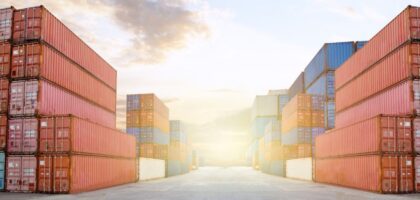If you looked up the definition of a “freight forwarder” in the dictionary, it would signify them as “a person or firm that arranges to pick up or deliver goods on instructions of a shipper or a consignee from or to a point by various necessary conveyances and common carriers.” That’s a great definition, but how can you explain that to a person who has never even heard of a freight forwarder?
Think of it this way: A freight forwarder is essentially a travel agent for your freight.
When you think of a travel agent planning a trip for you, they take care of everything from booking the flights and the hotel, establishing the parties who will be taking you to the airport and picking you up, planning your meals and events, and ensuring that everything on your trip goes smoothly as your one point-of-contact. This same exact concept applies to a freight forwarder.
A freight forwarder takes care of everything from the beginning to end of your shipment. From booking the carriers and setting up the type of service to filling out the paperwork and clearing customs to communicating with the vendors and providing updates to the customer along the way, a freight forwarder acts as the intermediary and one point-of-contact between the shipper (business or person shipping the freight) and the consignee (business or person receiving the freight).
What does a freight forwarder do exactly?
Well, aside from the above mentioned, a freight forwarder facilitates domestic and international shipping for both the B2B and B2C markets. Forwarders have many responsibilities including, but not limited to:
- Negotiating freight costs with both domestic and global carriers;
- Selecting appropriately licensed and vetted vendors to transport cargo;
- Providing the preparation of shipments and additional insurance coverage;
- Offering knowledgeable experts to walk customers through the shipping process and educate them on different aspects of the industry;
- Being the responsible party for clearing freight through customs and ensuring the correct documentation is provided;
- Facilitating the movement of freight through selected modes of transportation; and
- Overseeing the offloading of cargo from ocean and air carriers.
Why is using a freight forwarder the right move?
Depending on the type of business, utilizing a freight forwarder to handle the logistics and oversee the company’s supply chain may be the smartest option.
1. They provide a stress-free way to transport freight.
Freight forwarders are the masters of moving freight. They take care of every facet of the shipping process from storage and packing to pick up and delivery. In addition, they arrange every step of the route, as well as select the type of transportation. They handle the paperwork and customs hassles with international cargo and can complete it much quicker than the average person. As the customer, you can sit back and relax and track your freight throughout the process without having to do much of anything.
2. They offer a wide range of services that a company itself cannot provide.
Unlike a company who handles their own logistics internally, a freight forwarder has the capability to assist with the supply chain process on multiple levels, including customs clearance, international export and import documentation, cargo insurance, and inventory management. They specifically specialize in areas like this to make life easier for the end user.
3. They have industry connections and relationships that are vital to the supply chain.
Well-established freight forwarders have spent the time to create, maintain, and nurture relationships with global vendors from trucking companies to airlines to steamship lines. In the grand scheme of things, these connections will not only help customers obtain better pricing for shipping cargo, but it will also ensure that goods arrive in a timely manner. These relationships also allow for quick and efficient resolutions when issues arise along the way—something experienced freight forwarders have the knowledge of dealing with and solving.
4. They help save time with the best shipping option.
Finding the quickest shipping option, negotiating the best rates, and coordinating your shipments with international carriers is not only daunting, but incredibly time-consuming when logistics is not your forte. Instead of spending countless hours attempting to setup the details of your shipments, your time would be best spent on growing your business—not trying to complete tedious tasks and filling out forms that could cost you more money in the long-run if there are obvious errors.
5. They help companies save money by avoiding common mistakes.
Speaking of errors, freight forwarders can help businesses avoid common pitfalls that typically arise when companies try to move their freight themselves. One of the biggest offenders is inaccurate, misfiled, or non-filed paperwork. This can hold up cargo and end up costing a lot more than anticipated.
Another common mistake is when cargo gets held up somewhere, companies think that a simple phone call will solve everything. That is not the case. If someone does not know what they are doing, you can incur additional charges, such as storage or equipment detention. If this happens, you could end up paying thousands of dollars simply because you chose to move the freight on your own.
6. They ensure cargo safety and protection.
A good freight forwarder does their due diligence and has established a selection process before they add a company to their transportation suppliers’ list. There are several factors that go into choosing the best carriers to move freight. Some of these include how long the company has been in business, their reputation in the marketplace, their safety record, and their cargo liability insurance. By completing this process, a freight forwarder can assure that their customers’ valuable freight will be in good hands.
In addition, a freight forwarder can also offer additional cargo insurance, as the carrier’s cargo liability is often not enough to over the value of your merchandise if loss or damage does occur.
Resources:
- What is a Freight Forwarder? (Logical Logistics)
- 13 Things You Need to Know About Freight Forwarding (Universal Cargo)
- 3 Reasons Why You Must Use a Freight Forwarder (Latin American Cargo)
- Top Reasons Why You Should Hire a Freight Forwarder (M Solution Groups)




